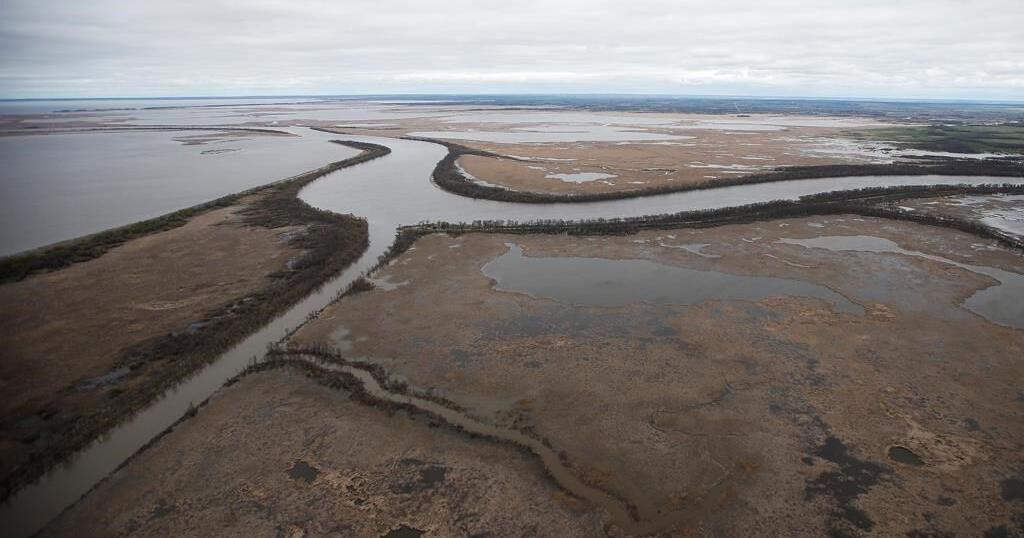Here is a roundup of stories from The Canadian Press designed
to bring you up to speed on what you need to know today…

Here is a roundup of stories from The Canadian Press designed
to bring you up to speed on what you need to know today…
Make all health records digital by 2028: report
The Public Policy Forum says Canada’s handling of health records is woefully out of date and negatively affecting patient care.
A report releasedtoday by the non-profit organization calls for health records to be digital and accessible to all members of a patient’s care team by 2028.
The report says one of the first steps required is to stop using fax machines to transmit medical information.
It says allCanadians should have a digital medical record that includes electronic referrals and electronic prescriptions.
Manulife-Loblaw deal raises concerns: experts
Some pharmacare policy experts are raising concerns about competition and patient access to much-needed medication after Manulife Financial Corp. announced its coverage of certain prescription drugs will only apply at Loblaw Cos. Ltd. pharmacies.
The new arrangement, details of which were shared with plan holders earlier this month, affects around 260 medications under the insurance company’s Specialty Drug Care program. Drugs in this class are meant to treat complex, chronic or life-threatening conditions such as rheumatoid arthritis, Crohn’s, multiple sclerosis, pulmonary arterial hypertension, cancer, osteoporosis and hepatitis C.
Such deals that provide exclusivity, known as preferred pharmacy network arrangements, are common in the U.S. and growing in Canada, said Steve Morgan, an economist and professor of health policy at the University of British Columbia.
First Nation focuses on mental health, ‘more joy’
Small, white crosses dot a graveyard just outside Neskantaga First Nation in northern Ontario. Some graves are marked with white picket fences, flowers have been placed at others. Most have no names or ages, but some do.
A 16-year-old girl rests in one plot, a 13-year-old in another. Suicide brought them both there.
Ten years ago, the remote community, with a population of about 450, declared a state of emergency after four suicides and several attempted suicides by teens.
The state of emergency officially remains, but the community quietly spoke about a small milestone this past summer: no one had killed themselves in Neskantaga in three years.
The focus on building bonds is important, said Chief Chris Moonias.
Lionel Desmond inquiry: final report due Wednesday
A provincial inquiry is set to release its final report into what led an Afghanistan war veteran with PTSD to kill his family members and himself seven years ago.
Lionel Desmond bought a semi-automatic rifle on Jan. 3, 2017, and later that day fatally shot his mother, wife and 10-year-old daughter before taking his own life in the family’s rural Nova Scotia home.
The killings stunned the province and prompted questions about how such an awful thing could happen.
Now after lengthy delays caused by the pandemic and the replacement of the judge presiding over the inquiry, Canadians will learn the answers when the inquiry’s findings are released Wednesday.
Saskatchewan stabbing inquest reaches final stages
Jurors are set to receive instructions from a coroner this morning as an inquest into a mass stabbing on a Saskatchewan First Nation reaches its final stages.
He died in police custody a few days later.
The six jurors heard the final evidence of the inquest Monday and will begin deliberations today on recommendations to help prevent similar deaths in the future.
Over the last 11 days, the inquest heard how the rampage unfolded from RCMP officers at the scene and health-care officials organizing the response from paramedics and hospitals.
It has also heard about Sanderson’s life, personal relationships and prison history.
—
Flood, avalanche risks remain elevated in B.C.
The flood and avalanche risks remain elevated throughout British Columbia’s South Coast, where atmospheric rivers continue to bring heavy rains along with unseasonably warm temperatures.
B.C.’s River Forecast Centre is maintaining a flood warning for the Squamish River, saying flows had reached somewhere between a two- and five-year return period at a gauge near Brackendale, north of the Squamish town centre.
Lower-level flood watches are in effect across the rest of the province’s South Coast, spanning all of Vancouver Island, the Sunshine Coast, the North Shore mountains, and parts of the Fraser Valley, including the Sumas River.
The latest Avalanche Canada forecast, meanwhile, shows the danger rating remains “high” throughout the south Chilcotin and Pacific mountain ranges, including alpine areas around Squamish, Whistler, Pemberton and Garibaldi Provincial Park.
—
This report by The Canadian Press was first published Jan. 30, 2024


LANGLEY, B.C. – Police in Langley, B.C., say one person is dead in a crash between a car and a motorcycle on Highway 1 that shut down the route for hours.
Mounties say their initial investigation indicates both vehicles were travelling east when they collided shortly before 4:20 a.m. near 240 Street on the highway.
The motorcycle rider died from their injuries.
Highway 1 was closed for a long stretch through Langley for about 11 hours while police investigated.
RCMP say their integrated collision analysis reconstruction team went to the scene.
The Mounties are asking anyone who witnessed the crash or who may have dash-camera footage from the area to call them.
This report by The Canadian Press was first published Sept. 19, 2024.
The Canadian Press. All rights reserved.

WINNIPEG – A court has been asked to declare Lake Winnipeg a person with constitutional rights to life, liberty and security of person in a case that may go further than any other in trying to establish the rights of nature in Canada.
“It really is that simple,” said Grand Chief Jerry Daniels of the Manitoba Southern Chiefs’ Organization, which filed the suit Thursday in Court of King’s Bench in Winnipeg.
“The lake has its own rights. The lake is a living being.”
The argument is being used to help force the provincial government to conduct an environmental assessment of how Manitoba Hydro regulates lake levels for power generation. Those licences come up for renewal in August 2026, and the chiefs argue that the process under which those licences were granted was outdated and inadequate.
They quote Manitoba’s Clean Environment Commission, which said in 2015 that the licences were granted on the basis of poor science, poor consultation and poor public accountability.
Meanwhile, the statement of claim says “the (plaintiffs) describe the lake’s current state as being so sick that she is dying.”
It describes a long list of symptoms.
Fish species have disappeared, declined, migrated or become sick and inedible, the lawsuit says. Birds and wildlife including muskrat, beavers, duck, geese, eagles and gulls are vanishing from the lake’s wetlands.
Foods and traditional medicines — weekay, bulrush, cattail, sturgeon and wild rice — are getting harder to find, the document says, and algae blooms and E. coli bacteria levels have increased.
Invasive species including zebra mussels and spiny water fleas are now common, the document says.
“In Anishinaabemowin, the (plaintiffs) refer to the water in Lake Winnipeg as moowaakamiim (the water is full of feces) or wiinaagamin (the water is polluted, dirty and full of garbage),” the lawsuit says.
It blames many of the problems on Manitoba Hydro’s management of the lake waters to prevent it flushing itself clean every year.
“She is unable to go through her natural cleansing cycle and becomes stagnant and struggles to sustain other beings like animals, birds, fish, plants and people,” the document says.
The defendants, Manitoba Hydro and the provincial government, have not filed statements of defence. Both declined to comment on the lawsuit.
Daniels said it makes sense to consider the vast lake — one of the world’s largest — as alive.
“We’re living in an era of reconciliation, there’s huge changes in the mindsets of regular Canadians and science has caught up a lot in understanding. It’s not a huge stretch to understand the lake as a living entity.”
The idea has been around in western science since the 1970s. The Gaia hypothesis, which remains highly disputed, proposed the Earth is a single organism with its own feedback loops that regulate conditions and keep them favourable to life.
The courts already recognize non-human entities such as corporations as persons.
Personhood has also been claimed for two Canadian rivers.
Quebec’s Innu First Nation have claimed that status for the Magpie River, and the Athabasca Chipewyan First Nation in Alberta is seeking standing for the Athabasca River in regulatory hearings. The Magpie’s status hasn’t been tested in court and Alberta’s energy regulator has yet to rule on the Athabasca.
Matt Hulse, a lawyer who argued the Athabasca River should be treated as a person, noted the Manitoba lawsuit quotes the use of “everyone” in the Charter of Rights and Freedoms.
“The term ‘everyone’ isn’t defined, which could help (the chiefs),” he said.
But the Charter typically focuses on individual rights, Hulse added.
“What they’re asking for is substantive rights to be given to a lake. What does ‘liberty’ mean to a lake?
“Those kinds of cases require a bit of a paradigm shift. I think the Southern Chiefs Organization will face an uphill battle.”
Hulse said the Manitoba case goes further than any he’s aware of in seeking legal rights for a specific environment.
Daniels said he believes the courts and Canadians are ready to recognize humans are not separate from the world in which they live and that the law should recognize that.
“We need to understand our lakes and our environment as something we have to live in cohesion with.”
This report by The Canadian Press was first published Sept. 19, 2024.
— By Bob Weber in Edmonton

OTTAWA – MPs on the public safety and national security committee voted unanimously to launch an investigation into an alleged Russian ploy to dupe right-wing influencers into sowing division among Americans.
A U.S. indictment filed earlier this month charged two employees of RT, a Russian state-controlled media outlet, in a US$10-million scheme that purportedly used social media personalities to distribute content with Russian government messaging.
While not explicitly mentioned in court documents, the details match up with Tenet Media, founded by Canadian Lauren Chen and Liam Donovan, who is identified as her husband on social media.
The committee will invite Chen and Donovan to testify on the matter, as well as Lauren Southern, who is among the Tenet cast of personalities.
The motion, which was brought forward by Liberal MP Pam Damoff and passed on Thursday, also seeks to invite civil society representatives and disinformation experts on the matter.
Court documents allege the Russians created a fake investor who provided money to the social media company to hire the influencers, paying the founders significant fees, including through a company account in Canada.
The U.S. Justice Department doesn’t allege any wrongdoing by the influencers.
Following the indictment, YouTube removed several channels associated with Chen, including the Tenet Media channel.
This report by The Canadian Press was first published Sept. 19, 2024.
The Canadian Press. All rights reserved.


New Brunswick Premier Blaine Higgs expected to call provincial election today
Sutherland House Experts Book Publishing Launches To Empower Quiet Experts


Arch Manning to get first start for No. 1 Texas as Ewers continues recovery from abdomen strain


Alberta Premier Smith aims to help fund private school construction


Canada’s Probate Laws: What You Need to Know about Estate Planning in 2024


Former Canada captain Atiba Hutchinson tells his story in ‘The Beautiful Dream”


New Brunswick Premier Blaine Higgs kicks off provincial election campaign


New Brunswick election profile: Progressive Conservative Leader Blaine Higgs